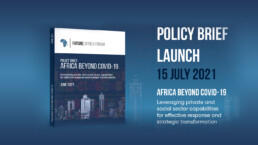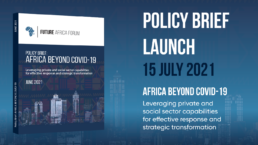Share
The world is still grappling with a major public health crisis due to the ongoing COVID-19 pandemic. The pandemic has led to a global recession, deaths and high levels of unemployment caused by a loss of almost 255 million full-time jobs in 2020- approximately four times greater than the number lost during the 2009 global financial crisis, as reported by the International Labour Organization.
Following the economic collapse last year caused by the pandemic, the World Bank posits that global growth is expected at 4% in 2021 after shrinking 4.3% in 2020, making it the fourth most severe global recession of the past 150 years surpassed only by World War I and II, and the Great Depression of the 1930s.
COVID-19 has forced many leaders to reconsider the kind of structural change they want. Currently, there is a paradigm shift and call for a “green recovery and transformation”. Cleaner air quality, healthier water, effective waste management, and enhanced biodiversity protection not only reduce the vulnerability of communities to pandemics and improve resilience, but have the potential to boost economic activity, generate income, create jobs, and reduce inequalities.
Industrial policies have been used by governments to enhance the productivity of firms that would in turn allow for economic growth and higher incomes for a country. As African countries continue to mitigate the health and economic crises posed by the coronavirus pandemic, environmental considerations should also be taken on board across all sectors of response and recovery efforts. This is where green industrial policy comes in. As defined by the Partnership for Action on Green Economy (PAGE) , green industrial policy refers to any government measure aimed to accelerate the structural transformation towards low-carbon and resource-efficient economies in ways that also enable productivity enhancements in the economy as a whole. Green industrial policy is an important and practical pathway for Africa to achieve inclusive and sustainable industrial development.
Many countries face severe environmental degradation and resource depletion, which hinders the aspirations of the Sustainable Development Goals (SDGs) commonly referred to as Agenda 2030, which aspires for countries to have a sustainable and economically viable future. With the current challenges posed by climate change and the pandemic, it is crucial for countries to ensure that their industries do not harm the environment and this can be achieved by re-thinking traditional industrial policies and embracing green industrial policy measures that focus on green technologies and resource efficient tools. Consequently, stimulus recovery packages in Africa should support the transition to a healthier, resource efficient, green and circular economy founded on sustainable consumption and production patterns anchored to sustainable value chains, as asserted in the UN’s framework for the immediate socio-economic response to COVID-19 .
Adopting green standards and certifications, for example, enables firms to differentiate their products from those of their competitors, therefore, putting those firms or countries in a comparatively advantaged position. Investments in green industries can generate a higher economic impact than less sustainable expenditures in other sectors consequently, creating more job opportunities and alleviating poverty, which are so important for the green recovery that countries aim for as stated by the United Nations Industrial Development Organization (UNIDO).
Green industrial policy can employ various strategies to create an effective and environmentally friendly industrial system. One such strategy is greening the existing industry, which entails supporting all industries regardless of their sector, size or location, to green their operations and products by using resources more efficiently and expanding renewable energy sources. A good example is the tea industry in Kenya, which has adopted technologies to become climate-resilient by using solar energy and wood residues instead of coal for drying processes.
With the commencement of trading under the African Continental Free Trade Area (AfCFTA) on 1st January 2021, governments need to adopt green measures to address climate change challenges on the continent particularly in agriculture, fisheries and tourism sectors thus contributing to sustainable trade within the AfCFTA. Further, it is imperative for countries to leverage finance and support from development partners, private sector and development finance institutions to invest in the green recovery.
As Africa continues to look at how it gets out of the COVID-19 pandemic, it should begin to see how to also plan for the future. We have a once-in-a-generation opportunity to chart a new global development path where countries can align their COVID-19 recovery packages with green industrial policy, for an African green recovery post-pandemic. Governments have a unique chance to put their countries on sustainable trajectories that prioritize economic opportunity, poverty reduction and planetary health at once. We must build back better and greener in order to achieve the ambitious yet vital goals of the SDGs and the Paris Agreement on climate change.
The views expressed in this article are those of the author and do not necessarily reflect the views of Future Africa Forum. Future Africa Forum is a pan-African policy think-tank and policy advisory consultancy headquartered in Nairobi, Kenya.



